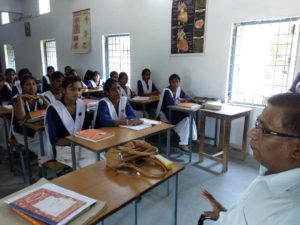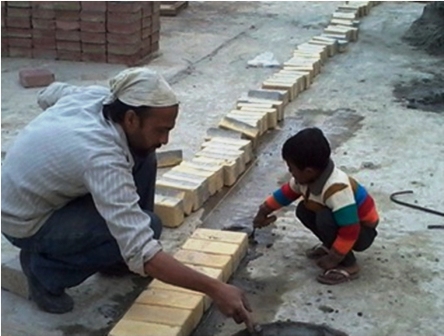EDUCATIONAL ORPHANS – Need to Democratize of Education
India, the largest democracy, in preamble of its constitution, guarantees social, economic and political justice, and equality of status and opportunity to its citizens. It is a political determination and commitment of the people of our country. Equality is just not confined to exercising franchise and justice; it is in every field, be it exercise of faith, owning property etc. including education. It was with this premise that RTE entitled ‘The Right of Children To Free and Compulsory Education Act-2009’ was promulgated. It envisages that every child of age six to fourteen years shall have as a right to free and compulsory education in a neighbourhood school till completion of elementary education. Need of the act after Sixty Two years of independence in itself is conveying enough the inaccessibility of educational opportunities to all. Ground reality on access to education is one aspect and access to quality education is another aspect. Discriminating between the two requires to go into basic purpose of education. Equality and justice are like two equal and inseparable sides of a coin called democracy and wherever either of the two faces are imbalanced it turns out to be undemocratic political and governance order.
Philosopher and thinkers at large emphasize upon education to attain enlightenment in respect of purpose of living, while many social reformers in pre-independence era emphasized upon education for socio-economic upliftment of people. In pre-independence era Jyoti Ba Fule, Rama Bai Ranade lead education to women, the best half of the society, while Mahatma Gandhi, alongwith the freedom struggle, was an exponent of downtrodden people.
Former president Dr. A.P.J. Abdul Kalam, envisaged equal opportunity to education to all; who may be born with unequal talent. His journey from a paper vender child to a renowned scientist, President of India, and an able teacher is exemplary.
Now that we are a Sixty Eight years of independent nation and Sixty Six years democracy, it is the time to ponder upon democracy in education. Recently, President Pranab Mukharjee during convocations at BITS, Misra, Ranchi and again at Shiv Nadar University expressed concern over standard of education and a need to improve upon it.
Here, aim is not to get lost in the statistical facts/lies but to brainstorm the issues with the elite readers of this e-Bulletin, and collectively explore possible remedies. There are three basic issues to education one is access to education, second is retardants in pursuit of education, and third is stimulants for pursuit of education. Education is since a long drawn process of self-carving retardants over a period of time predominate stimulants. Therefore, the Second and Third of the issues have been considered together.
As regards access to education is concerned, in our a country, by virtue of its size and diversity, successful implementation of RTE has its own challenges and a beginning in this, though too late, is taken optimistically. Nevertheless, the other Two issues unless addressed in full sincerity it is feared that RTE may not glow into its full bloom.
As regards retardants of education there are many, while salient of them are as under –
- Economic Condition – despite laws against child labour and RTE, parents in economically weaker section prefer to deploy their children for making their family earning sustainable. Therefore, generally they enrol their children in school not for learning but to avail facilities of freebies.
- Sociological Conditions: Neighborhood and living conditions of most of the students is not conducive to learning. Either, parents are edicts, separated or indulged in criminal activities. Moreover, in urban segment most of the children are first generation student. Thus they have none at home and/or surrounding to look upon education, inspiration or guidance.
- Environmental & Health conditions: Students victim of poverty are prone to infection and inability to receive necessary medical care. Thus generally prevalent ill-health conditions among them are cause of their absentiesm, dropouts and in the worst of the cases mortality.
- Geographical Conditions: On one hand school and colleges, not in neighborhood, is a severe retardant for girls; on the the contrary increase in transport facility in semi-urban and urban places children are making them increasingly dependent on carriage facility to go to schools. With this yardstick, it is difficult to visualize access of school to children in tribal and hilly terrain. Moreover, reach of teacher to school in remote and tough geograophical terrain is scanty, irregular and at times notional.
- Physical Inabilities: If factors enumerated above are so frightening, it is extremely difficult to visualize challenges of children who are victims of physical inabilities, which is for none of their faults. Special statutory provisions for physically disabled children is a solace but not a solution to build in them necessary competence for survival.
Aim of elementary education is to create read and write ability alongwith awareness of rights and duties in the social, economic, political environment. But, in a progressive and competitive world can a nation become complacent by facilitating elementary education? Is right of secondary and higher education privileged to only elite and affluent people? Can overall competence of a nation be more than that of its weakest segments? Despite many schemes and initiatives of benevolent and welfare in nature, why is that benefits visible on the ground are just a fraction of efforts and investment?
Unless, educati on system grooms competence to compete it lacks the basic substance for its justification and objectivity and it would be no exaggeration to call victims of such a system as educational orphans. All the philosophical discourses, unless translated into ground reality, are for people either with their bellies and needs over-filled or a frustrated lot. These retardants induce absenteeism and drop outs among them and thus defeat the very purpose of RTE.
on system grooms competence to compete it lacks the basic substance for its justification and objectivity and it would be no exaggeration to call victims of such a system as educational orphans. All the philosophical discourses, unless translated into ground reality, are for people either with their bellies and needs over-filled or a frustrated lot. These retardants induce absenteeism and drop outs among them and thus defeat the very purpose of RTE.
In such a scenario, unless, education system grooms competence to compete among the deprived lot, not as a philanthropy but as a policy to comply with the Personal Social Responsibility of all those occupying chair in the government, elite and affluent, it would lacks the basic substance for its justification and objectivity. Aim of education is to grow into a wise person who, while living for oneself works for upliftment and sustainable prosperity of people around him tending to extend upto whole humanity. It is only the human being who have this capability, where as all other creatures just live their life cycle.
In language there is antonym for every word and likewise for each of the the retardant there is a stimulus or accelerator, a mathematical positive. In view of the above some of the stimulants for education to deprived children that can be provided by teachers and elite by living as a role model are identified as under –
- Purpose of Education: impress upon students as to how can education change lives of students and their surrounding.
- Lightening Spark: is to create thirll of education.
- Facilitation of Education: like a toddler finger holding and support, not least of pampering, is required till a child becomes motivated.
- Mentoring for Excellence: education is neither about passing examination nor securing high marks and securing job with high salaries. . Education is just a process to cultivate thought provoking analytical and problem solving capability as well as an ability to perpetuate to other deprived ones, not a conscious effort but just intuitively.
- Moral Strength: ability to attain sustained growth and perpetuate it to deprived ones is an attribute of people with high moral strength and strong conviction for it. This moral strength can not be provided to students through lessons in books but by their exposure and interaction with true leaders of society and elite.
- Opportunities of Growth: Carrying forward the above propositions is linked to the famous proverb भूखे पेट हरि भजन न होई. Opportunities for growth are essential for person lifted with educational competence, else migration of such an educated lot to other places and countries can not be prevented.
Appeal: All learned readers are requested to ponder upon above issues and deem the role state, achiever, policy maker and elite, in whatever position they are. Seeing trajectory of social, political and financial crimes, which are in technology, profile and stakes tending to go higher, it can be sadly inferred that knowledge and technology is being used for inhuman purposes and such actor are apparently victims of ill education. If we collectively fail to arrest the erosion in education system, future of our descendants might be insecure and symptoms of same are visible. And we elite would not be able to excuse ourselves for the outcome, wherever we may be. Believe me, all that it needs is an honest concern, care and discipline of just a fraction of our time, with a dedication, beyond ourselves. I wish to share with you an astonishing experience - a lifetime satisfaction in purpose living, love, harmony and well-being around.
Dr. Subhash Kumar Joshi
(Coordinator, Gty
an Vigyan Sarita)

